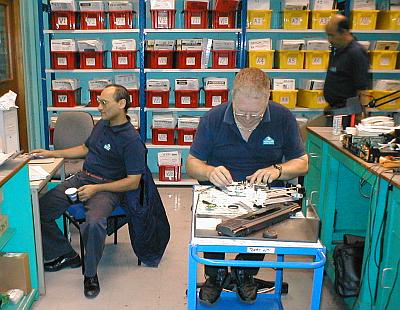
After a years sabbatical, followed by
a long job search, I landed a job at Mastercare as a TV bench engineer
in 1995. With remembered experiences of standing at my fathers side as
he repaired TV's back in the 1960's, I found it very easy to fit in. I
did have some previous specialist knowledge of TV circuitry, and
techniques, from a long standing interest in amateur TV.
I joined the company as a grade 4 engineer which was soon renamed as a
grade B engineer. In 1999 I was promoted to a grade C engineer. There
was absolutely no change in my duties, but the pay increased.
I was expected to be able to repair any domestic entertainment product.
That range included anything from huge projection TV's down to personal
Mini Disk players. My speciality was TV repair with a bias towards the
larger screen TV's.
The philosophy of the workshop was to attempt all repairs down to
component level, and except in a few very rare cases this was achieved.
It was at this time that I learnt the techniques to safely change
surface mounted components. Some of the biggest I.C.'s that I changed
had over 250 pins, but with proper tools and a good stereo microscope
it soon turned into just another routine operation.
I very soon earned a reputation as the engineer who was not afraid to
tackle any new technology, and was the only one who successfully
managed several repairs on Sony digital TV (OnDigital, ITV digital, and
now "Freeview") decoders. I was also the person to consult when PC's
started to be introduced into the workshop.
In many ways it was a hugely satisfying job. There was always something
new to learn, and I worked with some wonderful people. Against that
there were several downsides. It is an industry where health and safety
issues were slow to be addressed. With heavy lifting taking its toll on
many engineers in later life (this is true of the TV trade generally,
and not an issue specific to Mastercare). It is also an industry where
quantity came before quality. As such it was difficult to try and
produce results that you could be proud of, and yet maintain a
sufficient throughput to keep management happy. Coming from a more
professional background (B.T.), I did occasionally run into
difficulties with insufficient throughput, but at the same time the
quality of my work was highly regarded. There were many occasions when
I would be asked to deputise for the Senior Engineer when he was on
holiday, or otherwise unavailable.
One significant problem when working for Mastercare was that it was
just a tiny part of the Dixons empire whose expertise was in retail and
not engineering. This probably caused more problems for the managers
than for me. Beyond the confines of the workshop there was no
appreciation of the needs of the engineering staff. This came to a head
when it was announced that the workshop would be moved into a tiny
corner of a gigantic warehouse that served the retail side of the
company. It meant two things to me personally. First the travelling to
the new premises would be very difficult, and secondly the workshop
environment was designed by a shop fitter instead of an engineer. With
great reluctance I accepted a voluntary redundancy payment and left the
company. I was not alone. By the end of the next 12 months another 19
out of the original complement of 24 engineers had also decided to to
leave.
Hopefully this story will continue with a new company on a new page. If
my hopes bear fruit it will be a company with a more professional
outlook to electronic repair and testing.
